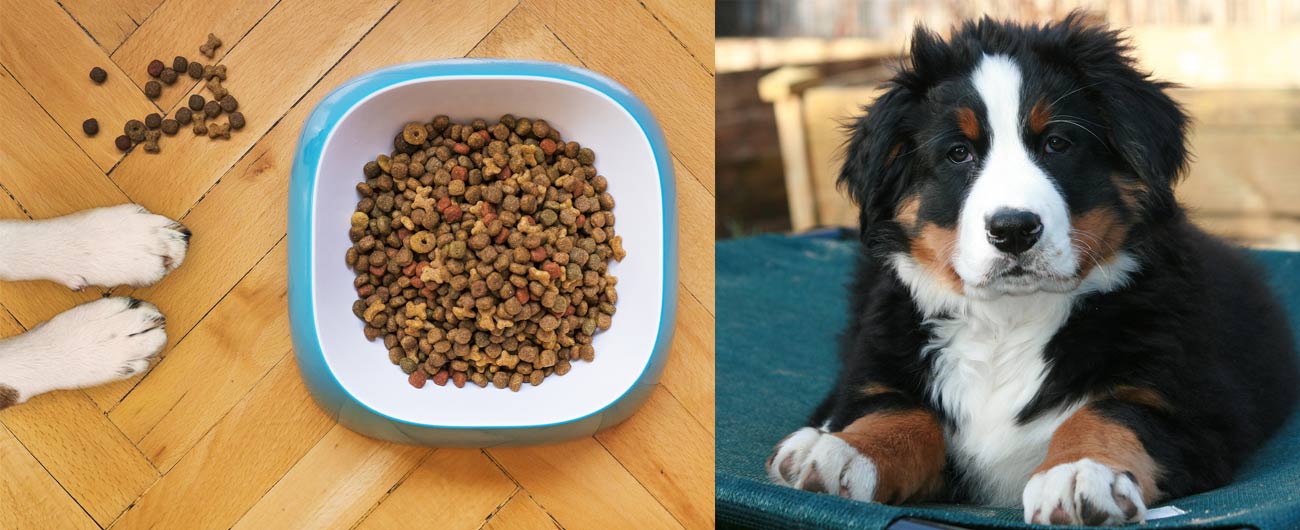Introducing the adorable and fluffy Bernese Mountain Dog puppy! If you’re wondering, “How much do I feed my Bernese Mountain Dog puppy?” Look no further. We’ve got you covered!
Feeding your furry friend is an essential part of their overall well-being, and getting it just right is key. So, let’s dive into the dos and don’ts of nourishing your Bernese Mountain Dog puppy.
But before we do, make sure to grab your notebook because you’ll want to take notes on these pup-tastic feeding tips!
Feeding a Bernese Mountain Dog puppy requires careful consideration. To ensure your furry friend grows up healthy, follow these guidelines:
- Determine the puppy’s age and weight.
- Choose a high-quality puppy food.
- Follow the recommended feeding guidelines on the food packaging.
- Divide the daily portion into several small meals.
- Monitor your puppy’s weight and adjust the portion size accordingly.
Consult your veterinarian for personalized advice.

How Much Do I Feed My Bernese Mountain Dog Puppy: A Complete Guide
Welcoming a Bernese Mountain Dog puppy into your home is an exciting time, but it also comes with its responsibilities, including feeding them the right amount of food. A proper diet is crucial for their growth, development, and overall health. In this comprehensive guide, we will answer the question, “How much do I feed my Bernese Mountain Dog puppy?” to ensure you provide the best nutrition for your furry friend.
Factors to Consider When Determining Your Bernese Mountain Dog Puppy’s Feeding Schedule
Determining your Bernese Mountain Dog puppy’s feeding schedule involves considering various factors that influence their nutritional requirements. Here are three key factors to keep in mind:
1. Age:
Bernese Mountain Dog puppies go through stages of growth and development, each with distinct nutritional needs. During the first few weeks, they rely solely on their mother’s milk. As they transition to solid food, it’s essential to adapt their diet accordingly. Weaning typically begins around 3-4 weeks, with a gradual shift to a puppy-specific diet by 8-10 weeks old.
During their rapid growth phase, between 3 and 6 months, Bernese Mountain Dog puppies require sufficient calories, protein, and essential nutrients. As they reach adulthood, you’ll need to adjust their portions to prevent overfeeding and potential weight gain.
2. Weight:
The weight of your Bernese Mountain Dog puppy is another crucial factor to consider when determining their feeding schedule. Weight can vary significantly among individuals, even within the same litter. Regularly monitor your puppy’s weight and consult your veterinarian to ensure they are on a healthy growth trajectory. Adjust their portions accordingly to maintain an ideal body condition score.
3. Activity Level:
Bernese Mountain Dogs are generally active dogs, but each puppy may have a different activity level. If your puppy is more energetic and participates in higher levels of exercise, they may require additional calories. On the other hand, less active puppies may need fewer calories to prevent excessive weight gain. Observe your puppy’s energy levels and adjust their food portions as needed.
The Importance of a Balanced Diet for Your Bernese Mountain Dog Puppy
A balanced diet is essential for the overall health and well-being of your Bernese Mountain Dog puppy. It should consist of:
1. High-Quality Puppy Food:
Invest in a high-quality and reputable puppy food brand that meets the Association of American Feed Control Officials (AAFCO) guidelines. Choose a formula specifically designed for large breed puppies to ensure appropriate nutrient levels for their growth.
2. Adequate Protein:
Protein is crucial for muscle development, tissue repair, and overall growth. Look for puppy foods that contain high-quality animal-based proteins, such as chicken or lamb, as the primary ingredients.
3. Essential Nutrients:
Your Bernese Mountain Dog puppy requires essential nutrients like vitamins, minerals, and fatty acids for optimal health. These nutrients support their immune system, bone development, and cognitive function. Ensure their food contains a balance of these nutrients.
4. Controlled Portion Sizes:
While it’s important to provide your Bernese Mountain Dog puppy with sufficient calories for growth, portion control is crucial to prevent obesity. Follow the feeding guidelines provided by the manufacturer based on your puppy’s weight and age, and adjust portions as they grow.
Feeding Your Bernese Mountain Dog Puppy: A Practical Guide
1. Establish a Feeding Routine:
Establishing a consistent feeding routine for your Bernese Mountain Dog puppy is crucial for their digestion and overall well-being. Decide on a specific time for meals and stick to it. Avoid free-feeding or leaving food out all day, as it can lead to overeating and weight gain.
2. Monitor Their Body Condition:
Regularly monitor your puppy’s body condition by assessing their weight, rib visibility, and waistline. If you can’t feel their ribs or notice a lack of waist definition, it may be a sign that they are overweight. Adjust their portions accordingly in consultation with your veterinarian.
3. Avoid Overfeeding Treats:
While treats are an important part of training and bonding with your Bernese Mountain Dog puppy, it’s essential to avoid overfeeding them. Treats should make up no more than 10% of their daily calorie intake. Opt for healthy, low-calorie treats or use a portion of their regular kibble as rewards during training sessions.
Conclusion:
Feeding your Bernese Mountain Dog puppy the right amount of food is crucial for their growth, development, and long-term health. Consider factors such as age, weight, and activity level when determining their feeding schedule. Provide a balanced diet with high-quality puppy food, adequate protein, essential nutrients, and controlled portion sizes. Establish a feeding routine and monitor their body condition to prevent overfeeding or obesity. With these guidelines in mind, you can ensure that your Bernese Mountain Dog puppy receives the nutrition they need to thrive.
Key Takeaways: How Much Do I Feed My Bernese Mountain Dog Puppy
- Feeding a Bernese Mountain Dog puppy requires a balanced diet to support their growth and development.
- Consult your veterinarian to determine the appropriate daily calorie intake for your puppy based on their age, weight, and activity level.
- Divide your puppy’s daily food allowance into several small meals throughout the day to prevent overeating and aid digestion.
- Avoid free-feeding your puppy to maintain a healthy weight and prevent obesity.
- Monitor your puppy’s body condition and adjust their food portions as needed to ensure they are neither underweight nor overweight.
Frequently Asked Questions
Welcome to our FAQ section where we answer the most common questions about feeding a Bernese Mountain Dog puppy. We understand that as a new owner, you want to ensure your furry friend is getting the right amount of food for their growth and development. Read on to find answers to your questions!
1. What is the recommended daily amount of food for a Bernese Mountain Dog puppy?
Feeding a Bernese Mountain Dog puppy is crucial for their health and well-being. The recommended daily amount of food for a Bernese Mountain Dog puppy is usually around 2 to 3 cups of high-quality puppy food, divided into three meals throughout the day. It’s important to follow the feeding guidelines provided by the specific puppy food brand as they may have variations in their recommended portions.
Keep in mind that every puppy is unique, and factors such as age, weight, activity level, metabolism, and overall health should be considered when determining the exact amount. Consult with your veterinarian to determine the ideal portion for your individual puppy.
2. How often should I feed my Bernese Mountain Dog puppy?
A Bernese Mountain Dog puppy should be fed three meals a day until they are around six months old. This regular feeding schedule ensures that they receive a steady supply of energy and nutrients for their growing bodies. After six months, you can gradually transition them to two meals a day to align with their adult feeding schedule.
Make sure to establish a consistent feeding routine by feeding them at the same times every day. This helps them develop good eating habits and prevents them from overeating or becoming picky eaters. Remember to provide fresh water at all times, especially during meal times.
3. Should I free-feed or have a structured feeding schedule for my Bernese Mountain Dog puppy?
Having a structured feeding schedule is highly recommended for Bernese Mountain Dog puppies. This means providing meals at regular intervals throughout the day instead of allowing them to free-feed (having food available all day). A structured feeding schedule helps with their digestion, prevents overeating, and aids in house-training.
By having set meal times, you can monitor your puppy’s food intake, ensure they are eating properly, and detect any changes in their appetite or behavior. It also allows you to establish a routine, making it easier to manage their feeding and bathroom schedule.
4. When should I transition from puppy food to adult food?
The transition from puppy food to adult food varies depending on the individual puppy and their rate of growth. On average, Bernese Mountain Dogs can be transitioned to adult food at around 12 to 18 months of age. However, it is important to consult with your veterinarian to determine the best time based on your puppy’s development and specific nutritional needs.
During the transition period, gradually mix increasing amounts of adult food into their puppy food over a span of about a week or two. This gradual transition helps prevent any digestive upset or discomfort. Your veterinarian can provide guidance on the appropriate adult food and help you create a smooth transition plan.
5. How can I tell if my Bernese Mountain Dog puppy is getting the right amount of food?
Monitoring your Bernese Mountain Dog puppy’s body condition is key to determining if they are getting the right amount of food. A puppy at a healthy weight should have a visible waistline when viewed from above and a palpable ribcage without being overly prominent. They should also have enough energy to engage in play and exercise without appearing excessively tired or lethargic.
If you notice your puppy gaining too much weight or becoming overweight, you may need to adjust their portion sizes. On the other hand, if they are losing weight or seem underweight, it’s essential to consult with your veterinarian to ensure there isn’t an underlying health issue. Regular growth monitoring and veterinary check-ups will help you ensure your puppy’s nutritional needs are being met.

Feeding your Bernese Mountain Dog puppy is important to keep them healthy and happy. They need a balanced diet with the right amount of food based on their age, weight, and activity level. It’s best to follow the guidelines provided by your veterinarian or consult a reputable source for specific feeding recommendations. Remember to monitor their weight, adjust portion sizes accordingly, and provide fresh water at all times. Additionally, it’s essential to establish a feeding schedule and avoid overfeeding to prevent obesity and potential health issues in the future.
Overall, feeding your Bernese Mountain Dog puppy involves finding the right balance and following proper guidelines. By doing so, you can ensure they receive the nutrition they need and help them grow into strong and thriving adult dogs.
